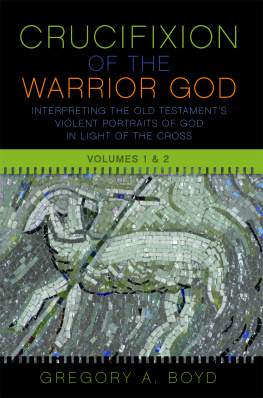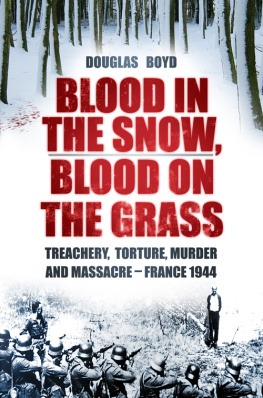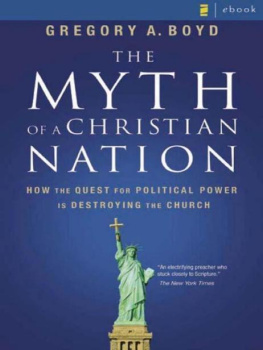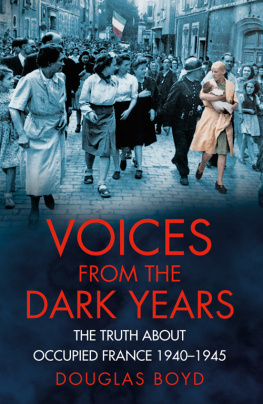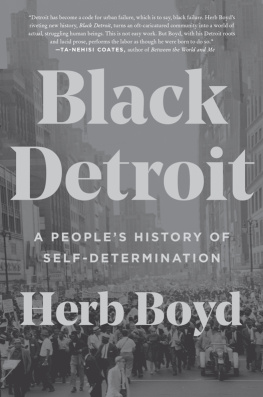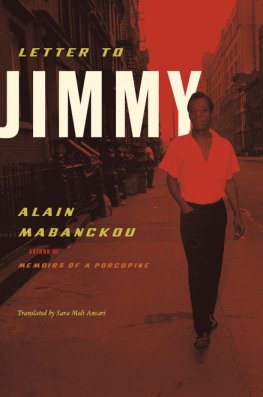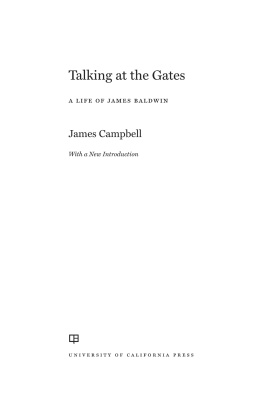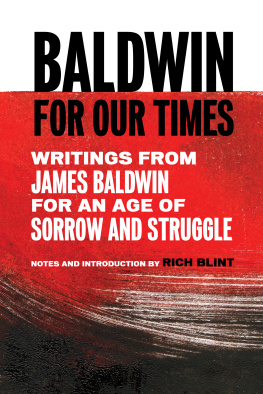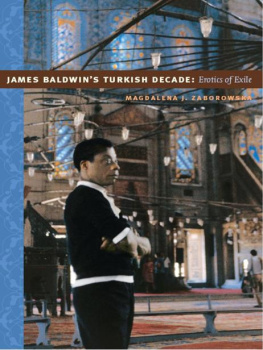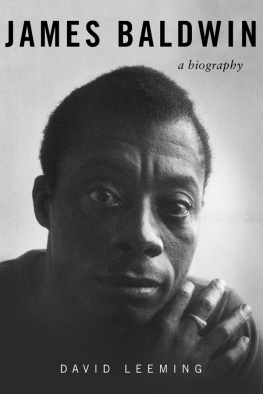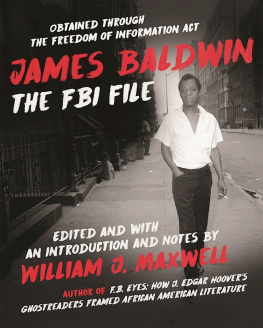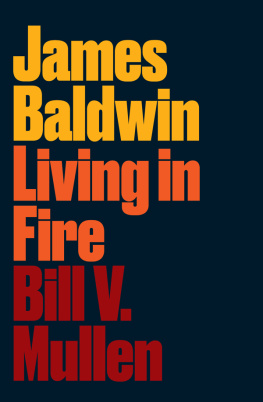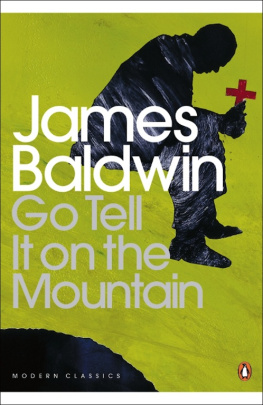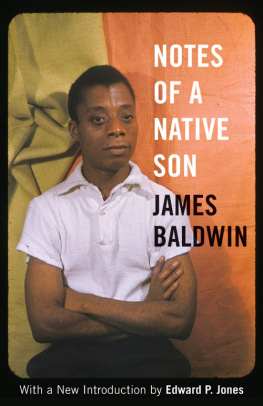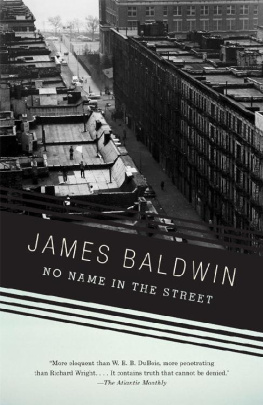BALDWINS HARLEM
BALDWINS HARLEM
A BIOGRAPHY OF JAMES BALDWIN
HERB BOYD


A Division of Simon & Schuster, Inc.
1230 Avenue of the Americas
New York, NY 10020
www.SimonandSchuster.com
Copyright 2008 by Herb Boyd
All rights reserved, including the right to reproduce this book or portions thereof in any form whatsoever. For information address Atria Books Subsidiary Rights Department, 1230 Avenue of the Americas, New York, NY 10020
First Atria Books hardcover edition January 2008
ATRIA BOOKS and colophon are trademarks of Simon & Schuster, Inc.
For credits and permissions, please see page 234.
For information about special discounts for bulk purchases, please contact Simon & Schuster Special Sales at 1-800-456-6798 or business@simonandschuster.com.
Designed by C. Linda Dingler
Manufactured in the United States of America
10 9 8 7 6 5 4 3 2 1
Library of Congress Control Number: 2007014719
ISBN-13: 978-0-7432-9307-5
ISBN-10: 0-7432-9307-X
eISBN-13: 978-1-4165-4812-6
TO: ELZA, THE KATHERINES, AND THE BALDWINS
FOREWORD
BY PENIEL E. JOSEPH
Perhaps more than any other writer before or since, James Baldwin distilled the anger, pain, and passion of black life in America and beyond. As an essay-ist, playwright, and novelist Baldwin forever transformed public commentary and political inquiry on issues of race, violence, and democracy.
As a public intellectual Baldwin dialogued with Malcolm X, marched with Martin Luther King, Jr., defended black student demonstrators, and predicted that the United States would hasten its own demise if it failed to practice democracy within its own borders. During the civil rights movements heroic years, Baldwin rose to become the official transcriber of a blues people engaged in daily combats against personal insults, political indignities, and physical violence.
Baldwins success also announced the arrival of a literary maverick and intellectual provocateur bold enough to consort with the likes of Malcolm X, Elijah Muhammad, and Martin Luther King, Jr. His growing literary notoriety, acceptance by the mainstream intellectual establishment, and personal friendships with leading black political activists made him a target of some critics who accused him of exaggerating black misery to a largely white audience. Such critics confused Baldwins fierce compassion with surrender; mistook vivid, grim descriptions of Harlem as stereotyping; and regarded the writers celebrity as undeserved. By the early 1960s, diverse groups of writers and intellectuals, from black nationalists in Ghana to white liberals in New York City, debated the power and passion of Baldwins writing and his growing significance as a public intellectual.
Time catches up with kingdoms and crushes them, warned Baldwin in his best-known work, The Fire Next Time. Published in 1963 and hailed as a masterpiece of social criticism, Baldwins book challenged America to turn words into deeds and, failing that, excoriated the national hypocrisy that fostered white guilt without corresponding justice, and black death without corresponding remorse. Baldwins timing proved prophetic. The year 1963 was one of turbulence punctuated by racial violence in Birmingham, Alabama, the assassination of civil rights leader Medgar Evers, the murder of four little black girls at Birminghams Sixteenth Street Baptist Church, and the November 22 assassination of John F. Kennedy.
But Baldwins words of fire also held out hope for racial reconciliation. If Malcolm X served as black Americas prosecuting attorney, collectively indicting whites for past crimes that could be traced back to antebellum slavery, Baldwin passionately pled for a stay of execution. The Fire Next Time established Baldwin as the preeminent black writer of his generation and tied him to the civil rights insurgency rapidly transforming Americas domestic priorities and national character. In May 1963, Attorney General Robert F. Kennedy tapped Baldwin to organize a doomed attempt at racial diplomacy.
In an effort to gauge the pulse of black folk, Kennedy asked Baldwin to organize a meeting with leading cultural and literary figures that included Lorraine Hansberry, Harry Belafonte, Lena Horne, and Professor Kenneth B. Clark. The meeting disintegrated into a raucous shouting match with many in the room criticizing the Kennedy administrations tentative civil rights policies. Baldwins role as Kennedys personal, if also uncontrollable, emissary raised Baldwins stature at the expense of the attorney general, whom one critic chided as the little man who wasnt there.
Widely recognized as an ardent supporter of civil rights, Baldwin was equally committed to black radicalism. After Baldwins speech at the March on Washington was censored, Malcolm X paid him the ultimate compliment, remarking that Baldwin was prevented from speaking at the event because he was liable to say anything.
And such was often the case. Whether arguing that the sit-in movement raging across the South in the early 1960s went beyond the consumption of overcooked hamburgers and tasteless coffee at various sleazy lunch counters, or defending the political right of Stokely Carmichael to protest against American racism, Baldwin remained an oracle of bold truths and uncomfortable insights. Like the prophet Jeremiah, Baldwins Old Testamentstyle candor at times fell on deaf ears but was rarely dismissed. While many contemporaries rejected the bruising polemics of Black Power activists during the late 1960s, Baldwin embraced embattled young activists, including Carmichael and Angela Davis, as a new generation of radical visionaries.
Baldwin first encountered the racial demons he would publicly wrestle with on a national stage as a child in Harlem. Baldwin came of age in a Harlem that was past the prime of its New Negro heyday in which Garveyites, literary prodigies, and working-class black folk had forged new arenas of cultural achievement and social and political struggle. Poverty, restlessness, and unpredictable spasms of violence shadowed Baldwins childhood. But Harlem also housed buried literary treasures, sidewalk street speakers extolling the virtues and values of a liberated future, and the hard-won courage etched in the faces of black men and women who remained defiant in the face of despair. Competing forces of hope and despair engaged in open combat on Harlem street corners. If despair claimed untold and undocumented lives during Baldwins youth, hope saved the unusual-looking child with no memories of his biological father.
Harlem remains central to understanding James Baldwins literary and political stature, impact, and resonance. Both Harlems and James Baldwins impact can be seen in the prodigious works of Detroit native and longtime Harlemite Herb Boyd. No writer is better able to begin the long-overdue task of connecting James Baldwin to his birthplace, and Baldwins Harlem takes us to the corner of the world that indelibly shaped Baldwins literary work and political activism. Boyd has navigated a complex, difficult undertaking with eloquence, verve, and style, transporting us back to an era that becomes increasingly blurred with the passage of time. For Boyd, Harlem and Baldwin remain forever linked through personal experience and literary imagination.
Both the iconic neighborhood and iconic writer were permanently etched in the imagination, consciousness, and history of the other. At a moment when Harlem is undergoing a painful, at times invigorating, process of transformation whose end result remains unclear, remembering
Next page

